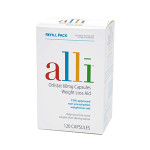A new study sends out a strongly worded warning about risks of kidney, liver, and other organ damage from the most popular weight loss drugs on the market, according to Forbes.
Orlistat, which goes by the prescription brand name Xenical and the over-the-counter name Alli, can cause “severe toxicity” to major internal organs, according to a University of Rhode Island study funded by the National Institutes of Health (NIH), confirming what some critics have said about these drugs in the past.
The research results obtained by pharmacology professor Bingfan Yan were worrying enough that he immediately reported the results to the FDA, which approved Orlistat in 1999.
Liver and kidney damage are serious enough, but Yan’s team also reported another finding, just as concerning, that Orlistat’s metabolic action reduces the effectiveness of many medications, including life-saving cancer treatments. In fact, the researchers reported that cancer cells multiplied faster under the influence of Orlistat. Orlistat also boosts the anti-clotting effects of aspirin, raising the risk of bleeding both internal and external.
Yan and his team found that Orlistat – even at low doses – limits the function of a key enzyme called carboxylesterase-2, which has an important role in detoxifying the liver, kidneys, and entire gastrointestinal tract. Preventing this enzyme from doing its job, the report says, may result in “severe toxicity of internal organs.”
Yan is a highly respected pharmacologist noted for his discoveries of dangerous drug interactions and an author (among several) of the Encyclopedia of Drug Metabolism and Interactions.
This is not the first news we’ve heard about the dangers of these drugs.
In May 2010 the FDA issued a warning about “severe liver injury” linked to use of the weight loss drug, following 12 reports of severe liver toxicity from other countries tied to Xenical and one for Alli in the US. In two cases the patients died of liver failure and in three cases they needed liver transplants. However, the FDA stressed that a “cause and effect relationship of severe liver injury with Orlistat use has not been established”.
Since Orlistat became available over the counter as Alli in 2007, its popularity has increased enormously. On its MyAlli website, GlaxoSmithKline alerts consumers to the 2010 FDA-approved label change, and follows that with a 2011 company statement confirming the safety of Alli, but has no mention of the current report. Alli, when taken correctly, is half the strength (60 mg) of prescription Xenical (120 mg).
Orlistat works by blocking the effect of ezymes that break down fats in the intestines, so they are not converted into free fatty acids for absorption in the body but excreted in undigested form through the feces instead.
The main side effect that users experience when they take the drug is oily and loose stools with excessive gas because of the unabsorbed fat reaching the large intestine. They can also experience fecal incontinence and a frequent, urgent need to empty the bowels. To minimize side effects users are urged to avoid foods with high fat content and follow a low-fat, calorie-reduced diet.
Last April, a US consumer advocacy group, Public Citizen called on the FDA to ban Orlistat, saying, “The weight loss drug Orlistat (known as Alli and Xenical) should be banned because of increasing evidence that it causes liver damage, kidney stones and pancreatitis.”
Director of Public Citizen’s Health Research Group, Dr Sidney Wolfe, told the press that:
“These drugs have the potential to cause significant damage to multiple critical organs, yet they provide meager benefits in reducing weight loss in obese and overweight patients.”
Yet these items still remain on the market.
Some of the study results were published in an issue of Biochemical Pharmacology and the University of Rhode Island issued an announcement with more detailed results.

